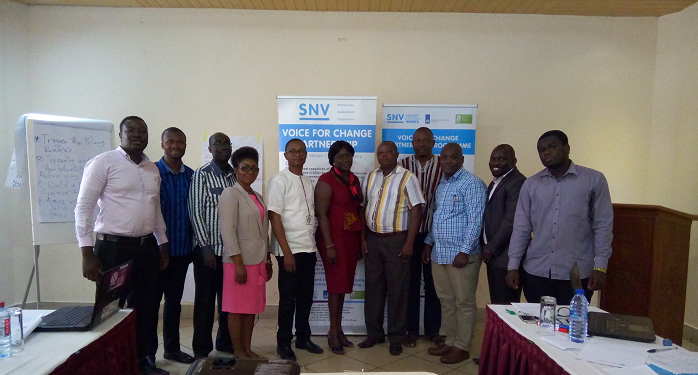
Alliance for WASH Advocacy commends government
The Alliance for WASH Advocacy has commended the government for taking steps toward ensuring sustainable sanitation access for all Ghanaians.
They also lauded President Akufo-Addo for the launch of the National Sanitation Campaign.
The campaign, which is being implemented by the Ministry of Water Resources and Sanitation is expected to change the attitude of Ghanaians as regards proper sanitation.
Read Also: Poor sanitation costs Ghana $290m annually
The Alliance, comprising nongovernmental organisations and networks, including WaterAid Ghana, CONIWAS, Intervention Forum, World Vision, SafeWater Network, SNV-Ghana, IRC, People’s Dialogue, Catholic Relief Services (CRS) and Plan International Ghana have pledged their support to ensure that the goals of the government towards improving the sanitation conditions of the country are achieved.
This was contained in a communique issued by the group at the end of a day's meeting held in Accra to discuss issues on the WASH sector in Ghana.
Full communique below:
COMMUNIQUE
Issued by the Alliance for WASH Advocacy
We, the members of the Alliance for WASH Advocacy, made up of nongovernmental organisations and networks including WaterAid Ghana, CONIWAS, Intervention Forum, World Vision, SafeWater Network, SNV-Ghana, IRC, People’s Dialogue, Catholic Relief Services (CRS) and Plan International Ghana,convened a meeting on Friday, 17th November, 2017 in Accra to discuss issues on the WASH sector in Ghana.
Having extensively deliberated on WASH sector issues and recent developments including the launch of the National Sanitation Campaign by His Excellency, the President of the Republic of Ghana, Nana Addo Dankwa Akuffo Addo, the alliance, do hereby agree to put forth the following:
• Commend government for taking steps towards ensuring sustainable sanitation access for all through the key highlights of the national sanitation campaign :
1. The establishment of the National Sanitation Authority.
2. The establishment of a National Sanitation Brigade to enforce sanitation laws nationwide.
3. The establishment of the National Sanitation Fund (which is to be detailed out later).
4. The charge to Local Government to see to adherence regarding‘one house, one toilet policy’.
5. The charge to the Ministry of Sanitation & Water Resources (MSWR) and the Attorney General’s office to set aside a day to try sanitation offenders.
6. The issuance of quarterly publications on Metropolitan, Municipal and District Assemblies (MMDAs) sanitation performances by the Minister for Monitoring & Evaluation.
7. The appointment of Sanitation Ambassadors to assist with the campaign.
8. The development of three (3) new material recovery sites for the recovery and recycling of waste from Accra.
9. Adequate resourcing of waste management companies with modern and effective tools to facilitate their work.
10. The assignment of Sanitation Marshals and their deputies (tasked to ensure compliance with sanitation bye-laws) to all government departments and agencies.
11. The deployment of automatic sweepers for major streets.
We acknowledge the enormous effort put into carving out this agenda and commendthe government in its bid to deal with poor sanitation and hygiene across the country. We remain committed to the firm belief that desirable changes within the sector will require strong leadership commitment, responsible national actions, and sustained and effective local strategies to materialize.
• As an alliance, promoting sustainable sanitation access for all and interested in the successful implementation of the National Sanitation Campaign, we wish to call the attention of the government to the following:
1. There should be clear definition of roles, structures and operational modalities for the respective Directors Generals and support staff of the National Sanitation Authority at the national, regional and district levels to ensure the avoidance of duplication and allow for their effective delivery and intra& inter-coordination with existing WASH & non-WASH sector actors at all levels.
2. Priority should also be given to the adequate resourcing of Sanitation Marshals in all Departments & Agencies and at the MMDA levels to ensure their effective functionality. When operationalized, their activities should be amply regulated to ensure that they are carried out with the integrity and verve that they warrant.
3. Extensive and sustained culturally appropriate Behaviour Change Communicationshould be vibrantly pursued by the government as part of increased efforts towards ending Open Defecation (OD) in all its forms. This, coupled with the apt adherence to the Government’s ‘one house, one toilet policy’,will result in significant headway being made.
4. For sanitation enforcement and compliance to thrive at the district level, priority should also be accorded to ensuring that all MMDAs develop, adopt and gazette their bye-laws.
4.1 The MSWR and the Attorney General’s office should work to set aside a month to review and approve all MMDAs bye-laws pending for the past four months and beyond to help fast track their gazetting and enforcement.
5. In addition to the quarterly publication of MMDAs’ sanitation performances, the institution of performance-based reward systems should be given consideration to add a more competitive edge to the pursuance of the sanitation agenda by MMDAs. (These do not necessarily have to be funded but could include procured sanitation equipment to further enhance the campaign).
6. The mobilization, disbursement & utilization of the National Sanitation Fund should necessarily be guided by prudent financial management procedures that ensure inclusiveness, transparency and accountability. Priority shouldalso be given to diversifying the fund’s sources. Fund management and control should be decentralised as much as possible to give room for these resources to be applied to relevant local sanitation problems without political interferences.
7. The National Sanitation Campaign should effectively embrace, at all levels, strong collaboration, broad-based consultations and active involvement of citizens, CSOs, media and civil society at large to ensure transparency, accountability, collective ownership and contribution to the process.
We commit, to collaborate with the Government of Ghana in working towards a more improved WASH sector and making Ghana one of the cleanest countries in Africa.
Accra, Friday November 17th, 2017.
